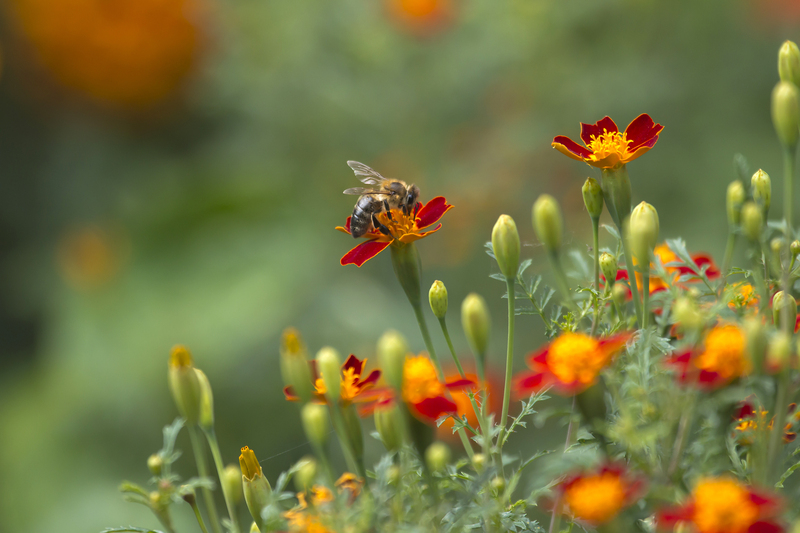Turning Scraps into Soil Gold
Posted on 02/09/2025
Turning Scraps into Soil Gold: A Comprehensive Guide
Have you ever wondered what happens to all the food scraps that end up in the garbage? Many people don't realize those so-called "scraps" hold the key to creating nutrient-rich soil, also known as soil gold. Welcome to the fascinating and eco-friendly world of transforming kitchen and yard waste into valuable compost for your garden.

What Does "Soil Gold" Mean?
The term soil gold refers to high-quality compost created from organic waste. It's called "gold" because of the immense value it provides to gardeners, farmers, and the environment. Turning scraps into soil gold is a sustainable process where organic materials such as vegetable peels, coffee grounds, eggshells, and yard clippings decompose over time, resulting in a nutrient-dense material that enriches soil health and boosts plant growth.
Why Turn Scraps into Soil Gold?
- Reduces landfill waste: A significant amount of household waste is organic and can be composted instead of ending up in landfills.
- Enriches soil: Compost nourishes the soil, promoting healthy plant growth and increased crop yields.
- Promotes sustainability: Recycling organic matter keeps valuable nutrients in the ecosystem.
- Saves money: Compost can replace commercial fertilizers and soil conditioners.
- Improves soil structure: Compost helps retain moisture and improves aeration in the soil.
The Science Behind Turning Scraps Into Soil Gold
Composting is the process by which microorganisms, such as bacteria and fungi, break down organic material. The result is a rich, dark, crumbly substance that gardeners and horticulturists lovingly call garden gold or black gold for soil. This transformation requires the right balance of "greens" (nitrogen-rich materials like kitchen scraps) and "browns" (carbon-rich materials like dried leaves or cardboard).
The Microbial Magic
During the composting process, a diverse array of microorganisms get to work, consuming the organic matter and turning it into humus--a vital component of fertile soil. The activity generates heat, speeds up decomposition, and eliminates many seeds and pathogens, resulting in clean, potent soil gold.
Types of Composting: Find Your Perfect Match
Converting your scraps into a valuable soil amendment can be done in several ways. Each may suit different spaces, lifestyles, and goals. Below are the most popular composting methods, designed to help anyone turn food waste into soil gold:
1. Traditional Backyard Composting
- Involves creating a compost heap or using a bin in your yard.
- Regularly add greens and browns, maintain moisture, and turn the pile to aerate it.
- Best for those with a garden or outdoor space.
2. Vermicomposting (Worm Composting)
- Uses specific types of worms--red wigglers--to break down organic waste.
- Ideal for indoor spaces, apartments, or small-scale composting.
- Produces worm castings, a supercharged form of soil gold.
3. Bokashi Composting
- A Japanese method that ferments food scraps using beneficial microbes.
- Works for almost all waste, including meat and dairy, in an airtight bucket.
- Fast and low-odor option; great for kitchens.
4. Trench Composting
- Bury scraps directly in your garden soil and allow microbes to do the work underground.
- Low-maintenance and doesn't require turning piles or bins.
- Excellent option for seasonal or low-effort composters.
What Can and Cannot Be Composted?
The Do's: What to Use for Soil Gold
- Fruit and vegetable peels
- Coffee grounds and filters
- Eggshells (crushed)
- Tea bags (plastic-free)
- Yard trimmings (grass, leaves, plant debris)
- Shredded newspaper or cardboard
- Wood chips and sawdust (untreated wood)
The Don'ts: Avoid These Items
- Meat, fish, and dairy (unless using Bokashi)
- Oily foods or greasy materials
- Pet waste from carnivores
- Diseased plants
- Plastic, glass, or metal
- Coal or charcoal ash
Step-By-Step Guide: How to Transform Scraps into Soil Gold
Step 1: Start Collecting Your Scraps
Keep a compost caddy or bucket in your kitchen for daily food scraps. A tight-fitting lid minimizes odors and deters pests. Collect items such as vegetable peels, eggshells, and coffee grounds. For garden gold success, avoid throwing in problematic items, as explained above.
Step 2: Set Up Your Composting System
Choose the method that suits your lifestyle: outdoor bin, worm bin, Bokashi, or trench. Location matters:
- Outdoors: Place your bin or pile in a shaded, well-drained spot.
- Indoors: Vermicomposting bins can sit under counters or on balconies.
- Bokashi: Keep the container accessible but away from direct sunlight.
Step 3: Maintain The Balance
For rapid decomposition and an odor-free process, follow the carbon-to-nitrogen ratio. Aim for roughly 3 parts "browns" (dry) to 1 part "greens" (wet). Layer food scraps with materials like dead leaves, shredded cardboard, or straw. Too many greens? Add more browns. Too dry? Sprinkle with water.
Step 4: Turn and Aerate
- Traditional compost: Use a pitchfork or compost turner to mix materials weekly. This supplies air to the microbes and speeds results.
- Worm bins: Gently fluff bedding every few weeks.
- Bokashi and trench: Little to no turning needed.
Step 5: Let Nature Work
Over the course of weeks to several months, your pile will heat up, shrink, and darken. When the material turns earthy-smelling and crumbly, it's ready--congratulations! You've made soil gold from scraps!
Maximizing the Benefits: Using Your Homemade Soil Gold
How to Apply Compost for Best Results
- Garden beds: Incorporate 1-2 inches into the topsoil of flower and vegetable beds each season.
- Potted plants: Mix a handful into potting mix or add as a top dressing.
- Lawns: Sprinkle a thin layer over grass to feed microbes and improve soil health.
- Trees and shrubs: Place compost in a donut shape around the base (avoiding the trunk).
Compost works slowly, feeding soil microbes which in turn nourish your plants. Used regularly, this practice builds a more resilient and productive landscape.
Extra Tips for Transforming Scraps Efficiently
- Chop scraps finely for faster decomposition.
- Keep the pile moist; compost should feel like a wrung-out sponge.
- Avoid adding too much of one ingredient; diversity leads to balanced compost.
- Harvest compost from the bottom of your pile or bin where it's most decomposed.
Environmental Impact: Turning Waste into a Sustainable Resource
The benefits of converting kitchen scraps into black gold for gardens extend beyond your home:
- Reduces greenhouse gases: Landfilled organic waste produces methane, a powerful greenhouse gas.
- Supports local biodiversity: Healthy soil sustains microbes, insects, and plant life.
- Decreases reliance on synthetic fertilizers: Compost is a natural alternative, free from harmful chemicals.
- Enhances food security: Rich soil increases crop yields and resilience to pests and diseases.
Did you know?
Every year, millions of tons of food waste are discarded. If each household composted, it would save significant landfill space and return vital nutrients to depleted soils--all from what's often viewed as mere garbage!
Common Challenges in Creating Soil Gold & Their Solutions
- Pile smells bad: This usually means too many greens or poor aeration. Solution: Add dry materials and turn the pile regularly.
- Pile too dry or not breaking down: Add water and ensure the pile is moist. Chop up larger pieces.
- Pests in the compost: Cover food waste, avoid meat/dairy, and use a bin with a lid.
- Compost too wet: Add more browns and turn to incorporate air.
Frequently Asked Questions About Composting Scraps into Soil Gold
- How long does it take to get finished compost?
Depending on method and conditions, between 2-12 months. Warmer, well-managed piles work fastest. - Can I compost in winter?
Yes! Composting slows but doesn't stop in cold weather. Insulating your pile with leaves or using an insulated bin helps. - Do I need a fancy bin to turn scraps into soil gold?
No! Even a simple pile on the ground or a DIY container will work. Bins can help control mess and pests, but aren't essential.

Inspiring Success Stories: How Others Turned Scraps Into Soil Gold
- Sarah from Portland started with a small vermicomposting bin under her sink. "My houseplants have never looked greener, and I feel good knowing I'm reducing waste," she says.
- Mark's community garden uses shared compost bins. "It's rewarding to see kitchen scraps become lush vegetable beds each summer. Composting builds community as well as soil!"
- A school in Texas launched a composting program and used the end product to start a pollinator garden, teaching students about sustainability and nature's cycles.
Conclusion: From Scraps to Soil Gold--A Journey Worth Taking
Turning scraps into soil gold is one of the most impactful ways you can contribute to a healthier planet while feeding your own garden's success. The process is simple, rewarding, and pays dividends in beauty and bounty. Every peel, coffee ground, and leaf you compost helps close the nutrient cycle, transforming what was once waste into a powerful resource for generations to come.
Ready to start turning your scraps into gold for your soil? All it takes is a few mindful changes to your daily habits. Start small, stay consistent, and watch your waste transform into garden treasure. The soil--and the planet--will thank you.
Suggested Resources for Further Reading
- EPA: Composting at Home
- Gardener's Supply Company: Composting Guide
- Royal Horticultural Society: Composting
From kitchen scraps to luscious garden beds, the journey to soil gold begins at home. So start today--and turn your waste into wealth!
Latest Posts
Creating a Relaxing Seating Oasis in Your Garden
Economical and Simple Garden Solutions with Low Maintenance Needs
Uncovering the Climate Change Combat Strategy: Gardening
Enchant Your Senses with Calming Zen Garden Ideas for Outdoor Bliss

